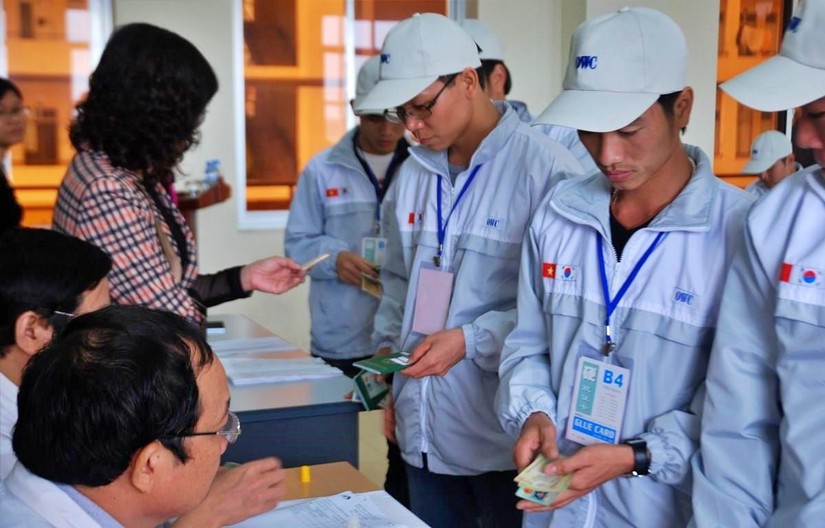TPP - Chapter 19 - Labor
Chapter 19 of the TPP Agreement stipulates the regulations and provisions directly related to internationally recognized labor rights.
CHAPTER 19
LABOR
Article 19.1: Definitions
For the purposes of this Chapter:
The International Labour Organization (ILO) Declaration refers to the International Labour Organization Declaration on Fundamental Principles and Rights at Work and its Follow-up (1998);
Labor laws are statutes, regulations, or provisions of statutes or regulations of a Party related directly to the internationally recognized labor rights below:
(a) freedom of association and the effective recognition of the right to collective bargaining;
(b) the elimination of all forms of forced or compulsory labor;
(c) the abolition of child labor, prohibiting the worst forms of child labor;
(d) non-discrimination in respect of employment and occupation; and
(e) acceptable conditions of work with respect to minimum wages, hours of work, and occupational safety and health;
Statutes and regulations or statutes or regulations mean:
(a) For Australia, Acts of the Federal Parliament, or regulations issued by the Governor-General in Council as authorized under an Act of the Federal Parliament;
(b) For Malaysia, the Federal Constitution, Acts of Parliament, and other legal statutes and regulations enacted under an Act of Parliament;
(c) For Mexico, Acts of Congress or regulations and provisions enacted under Acts of Congress for the purposes of this Chapter include the Constitution of the United Mexican States;
(d) For the United States, Acts of Congress or regulations and provisions enacted under Acts of Congress for the purposes of this Chapter include the Constitution of the United States;
Article 19.2: Statement of Shared Commitment
-
The Parties affirm their obligations as members of the ILO and commit to the principles concerning the fundamental rights as stated in the ILO Declaration within their respective territories.
-
The Parties recognize that, as stated in Paragraph 5 of the ILO Declaration, labor standards should not be used for protectionist trade purposes.
Article 19.3: Labor Rights
- Each Party shall adopt and maintain in its statutes and regulations the following rights as stated in the ILO Declaration:
(a) freedom of association and the effective recognition of the right to collective bargaining;
(b) the elimination of all forms of forced or compulsory labor;
(c) the abolition of child labor, prohibiting the worst forms of child labor; and
(d) non-discrimination in respect of employment and occupation;
- Each Party shall adopt and maintain in its statutes and regulations acceptable conditions of work with respect to minimum wages, hours of work, and occupational safety and health.
Article 19.4: Non-derogation
The Parties recognize that it is inappropriate to encourage trade or investment by weakening or reducing the protections afforded in each Party’s labor laws. No Party shall waive or otherwise derogate from, or offer to waive or otherwise derogate from its statutes or regulations:
(a) implementing Article 19.3.1 (Labor Rights) if the waiver or derogation would be inconsistent with the rights set out in that paragraph; or
(a) implementing Article 19.3.1 or 19.3.2 (Labor Rights), if the waiver or derogation would weaken or reduce adherence to the rights set out in Article 19.3.1, or acceptable conditions of work referred to in Article 19.3.2 (Labor Rights), in a special trade or customs area, such as an export processing zone or foreign trade zone, in the Party’s territory in a manner affecting trade or investment between the Parties.
Article 19.5: Enforcement of Labor Laws
-
No Party shall fail to effectively enforce its labor laws through a sustained or recurring course of action or inaction in a manner affecting trade or investment between the Parties after the date of entry into force of this Agreement.
-
If a Party fails to comply with its obligations under this Chapter, decisions regarding the allocation of enforcement resources shall not be a justification for such non-compliance. Each Party retains the right to exercise reasonable enforcement discretion and to make decisions regarding the allocation of enforcement resources to labor law enforcement activities concerning fundamental labor rights and acceptable conditions of work listed in Article 19.3.1 (Labor Rights) and Article 19.3.2 (Labor Rights), provided that the exercise of such discretion and such decisions are not inconsistent with the obligations under this Chapter.
-
Nothing in this Chapter shall be construed to empower the authorities of a Party to undertake enforcement activities in the territory of another Party.
Article 19.6: Forced or Compulsory Labor
Each Party acknowledges the goal of eliminating all forms of forced or compulsory labor, including forced or compulsory child labor. Considering the Parties' commitments under Article 19.3 (Labor Rights), each Party shall aim, through initiatives it considers appropriate, to discourage the importation of goods from other sources produced in whole or in part by forced or compulsory labor, including from forced or compulsory child labor.
Article 19.7: Corporate Social Responsibility
Each Party shall endeavor to encourage enterprises to voluntarily adopt corporate social responsibility initiatives on labor matters that have been endorsed or supported by that Party.
Article 19.8: Public Awareness and Procedural Guarantees
-
Each Party shall promote public awareness of its labor laws, including ensuring that information related to labor laws, enforcement, and compliance procedures is made publicly available.
-
Each Party shall ensure that persons with a recognized interest under its legal system in a particular matter have appropriate access to impartial and independent courts to enforce labor laws. These may include administrative tribunals, quasi-judicial tribunals, judicial courts, or labor courts as provided in each Party's laws.
-
Each Party shall ensure that proceedings before these courts for the enforcement of its labor laws are fair, equitable, and transparent; conducted in accordance with due process of law; and do not entail unreasonable fees or time limits or unwarranted delays. Any hearing in such proceedings shall be open to the public except where the administration of justice otherwise requires in accordance with its laws.
-
Each Party shall ensure that:
(a) the parties to such proceedings have the right to support or defend their respective positions, including by presenting information or evidence;
(b) final decisions on the merits of the case:
(i) are based on information or evidence on which the parties to the proceedings were able to be heard;
(ii) state the reasons on which they are based; and
(iii) are available in writing to the parties to the proceedings and the public in accordance with its laws.
-
Each Party shall provide that parties to such proceedings have the right to seek review and appeal, as appropriate under its laws.
-
Each Party shall ensure that final decisions of its courts in such proceedings can be effectively enforced and that the parties to such proceedings have the right to take necessary legal action to enforce their rights under its labor laws promptly.
-
Each Party shall provide procedures to ensure the effective implementation of final decisions in such proceedings.
Article 19.9: Public Submissions
-
Each Party, through its designated contact point as specified in Article 19.13 (Contact Points), shall ensure that it receives and considers submissions from another Party on matters related to this Chapter in accordance with its domestic procedures. Each Party shall make its procedures for the receipt and consideration of submissions public, including the timelines for the receipt and consideration of submissions.
-
A Party may require, in its procedures, that for a submission to be considered, it must at least:
(a) raise an issue directly related to this Chapter;
(b) clearly identify the person or organization making the submission; and
(c) explain, to the extent possible, how and to what extent the issue raised affects trade or investment between the Parties.
- Each Party shall:
(a) consider matters raised in a submission and provide a timely response to the person or organization that made the submission, including, where appropriate, in writing; and
(b) make submissions and responses public promptly, except where otherwise provided by its laws.
- A Party may request further information from the person or organization making the submission as necessary to consider the merits of the submission.
Article 19.10: Cooperation
-
The Parties recognize the importance of cooperation as a mechanism for effective implementation of this Chapter, to improve labor standards and promote mutual commitments related to labor matters, including the welfare and quality of life of workers, the principles and rights stated in the ILO Declaration.
-
To carry out cooperative activities, the Parties shall be guided by the following principles:
(a) consideration of each Party's priorities, level of development, and available resources;
(b) broad participation and mutual benefit of the Parties;
(c) capacity-building and technical assistance between the Parties to address labor protection issues and activities to promote innovative practices at the workplace;
(d) the generation of measurable, positive, and meaningful labor outcomes;
(e) resource efficiency, including through the use of technology where appropriate to maximize the utilization of resources in cooperative activities;
(f) complementarity with regional and multilateral initiatives to address labor issues; and
(g) transparency and public participation.
-
Each Party shall invite the views and participation, as appropriate, of stakeholders, including representatives of workers and employers, in identifying potential areas for cooperation and conducting cooperative activities. Subject to the agreement of the participating Parties, cooperative activities may be conducted through bilateral or multilateral frameworks and may involve relevant regional or international organizations such as the ILO and non-TPP members.
-
The costs of cooperative activities under this Chapter shall be borne by the participating Parties as decided on a case-by-case basis.
-
In addition to the cooperative activities outlined in this Article, the Parties, as appropriate, shall hold closed-door meetings and encourage their membership at regional and multilateral fora to advance mutual interests in addressing labor issues.
-
Areas of cooperation may include:
(a) creating jobs and promoting quality and productive employment, including job creation policies and promoting sustainable entrepreneurship;
(b) creating quality and productive employment related to sustainable development and developing skills for employment in emerging industries, including environmental industries;
(c) innovative workplace practices to enhance worker welfare and competitiveness;
(d) human resource development and increasing employment opportunities, including through lifelong and continuous education, training, skills development, and upgrading;
(e) work-life balance;
(f) promoting business and labor performance improvements, particularly for small and medium-sized enterprises;
(g) remuneration policies;
(h) raising awareness and respect for the principles and rights stated in the ILO Declaration and the concept of Decent Work as defined by the ILO;
(i) labor law matters, including effective enforcement of the principles and rights stated in the ILO Declaration;
(j) occupational safety and health;
(k) manpower management and labor arbitration, such as improving capacity, effectiveness, and performance;
(l) labor statistics collection and utilization;
(m) labor inspection, such as enhancing compliance mechanisms and enforcement;
(n) addressing the challenges and opportunities of diverse and multi-generational workforces, including:
(i) promoting equality and eliminating discrimination in employment and occupation for migrant workers or any other aspect of age, disability, and other characteristics not related to work value or requirements;
(ii) promoting equality, eliminating discrimination concerning women's employment interests; and
(iii) protecting vulnerable workers, including migrant workers, low-wage, or temporary workers;
(o) addressing labor and employment challenges in economic crises, such as through areas of common interest in the ILO Global Jobs Pact;
(p) social protection issues, including compensation for occupational injuries or illnesses, pension systems, and employment assistance schemes;
(q) best practices in labor relations, for example, improving labor relations, including promoting best conflict resolution mechanisms;
(r) social dialogue, including tripartite consultations and cooperation;
(s) labor relations in multinational enterprises, promoting sharing of information and dialogue concerning working conditions by enterprises operating in two or more Parties with workers’ representative organizations in each Party;
(t) corporate social responsibility; and
(u) other areas as the Parties may decide.
- The Parties may conduct activities in areas of cooperation described in Paragraph 6 through:
(a) workshops, dialogues, and other forums to share knowledge, experiences, and best practices, including online forums and other knowledge-sharing platforms;
(b) study tours, visits, and research to document and study policies and methods;
(c) collaborative research and development concerning best practices on topics of mutual interest;
(d) specific exchanges of experts and technical assistance where appropriate; and
(e) other forms as the Parties may decide.
Article 19.11: Labor Consultations
-
A Party may request consultations with another Party on any matter arising under this Chapter at any time by delivering a written request to the contact point designated by that other Party under Article 19.13 (Contact Points).
-
The request shall provide specific and sufficient information to support the request, including identification of the issues, the provisions of this Chapter under which the request is made, and, where applicable, how trade and investment between the Parties are affected.
-
Unless the requesting Party and the Party to which the request is made (the consulting Parties) otherwise decide, consultations shall commence within 30 days of the date of receipt of the request for consultations. The consulting Parties shall consult in good faith. The consulting Parties shall afford the opportunity to receive and consider the views of interested persons on the matter subject to consultations.
-
Consultations may be held in person or through any technological means that is convenient to the consulting Parties.
-
The consulting Parties shall address all issues raised in the request. If the consulting Parties resolve the matter, they shall document the outcome, including, where appropriate, specific steps and timelines for carrying out the agreed outcome. The consulting Parties shall make the outcome publicly available unless they jointly decide otherwise.
-
In developing outcomes pursuant to Paragraph 5, the consulting Parties should consider all available options and may jointly decide on any course of action they deem appropriate, including:
(a) developing and implementing any action plans in any form they deem satisfactory, potentially involving specific steps and verifiable measures such as undertakings, labor inspections or enforcement actions, and appropriate timelines;
(b) conducting independent verification regarding compliance or implementation by individuals or bodies, such as the ILO, selected by the consulting Parties; and
(c) appropriate incentives, such as cooperation and capacity-building programs, to encourage or support the consulting Parties in identifying and addressing labor issues.Article 19.12: Labor Council
-
The Parties shall establish a Labor Council (Council) consisting of representatives at the ministerial level or other levels as designated by each Party.
-
The Council shall convene within one year from the date this Agreement enters into force. Thereafter, the Council shall meet every two years unless the Parties decide otherwise.
-
The Council shall:
(a) consider matters related to this Chapter;
(b) establish and review priorities to guide the decisions of the Parties regarding labor cooperation and capacity-building activities undertaken pursuant to this Chapter, taking into account the principles set out in Article 19.10.2 (Cooperation);
(c) agree on a joint work program consistent with the priorities established under subparagraph (b);
(d) monitor and evaluate the implementation of this joint work program;
(e) review reports from the contact points designated under Article 19.13 (Contact Points);
(f) discuss issues of mutual interest;
(g) facilitate the participation and awareness of the public regarding the implementation of this Chapter; and
(h) perform any other functions as the Parties may decide.
-
In the fifth year after the date of entry into force of this Agreement, or if the Parties decide otherwise, the Council shall review the implementation of this Chapter to ensure its effective operation and report the results and any recommendations to the TPP Commission.
-
The Council may conduct subsequent reviews as agreed upon by the Parties.
-
Each Party shall alternate in chairing the Council.
-
All decisions and reports of the Council shall be made by consensus and made public, unless the Council decides otherwise.
-
The Council shall agree on a joint summary report of its work at the conclusion of each Council meeting.
-
The Parties shall, where appropriate, liaise with relevant regional and international organizations such as the ILO and APEC, on matters related to this Chapter. The Council may seek to develop joint proposals or cooperate with these organizations or with non-TPP countries.
Article 19.13: Contact Points
-
Each Party shall designate an office or a public employee within its labor ministry or equivalent organization as a contact point to address matters related to this Chapter within 90 days from the date this Agreement enters into force for that Party. Each Party shall promptly notify the other Parties of any changes to its contact point.
-
The contact points shall:
(a) facilitate information exchange and coordination between the Parties;
(b) assist the Council;
(c) report to the Council as appropriate;
(d) serve as a channel of communication with the public in their respective territories; and
(e) work together, including with other appropriate government agencies, to develop and implement cooperative activities, guided by the priorities of the Council, the areas of cooperation outlined in Article 19.10.6 (Cooperation), and the needs of the Parties.
-
The contact points may develop and implement specific bilateral and multilateral cooperative activities.
-
The contact points may exchange information and coordinate activities through direct meetings or using other technological means.
Article 19.14: Public Engagement
-
In carrying out their activities, including meetings, the Council shall provide a means for receiving and considering the views of interested individuals on matters related to this Chapter.
-
Each Party shall establish or maintain, and consult, a national consultative or advisory labor body, or a similar mechanism, for members of the public, including representatives of labor and business organizations, to present their views on matters related to this Chapter.
Article 19.15: Labor Consultations
-
The Parties shall make every effort through cooperation and consultations based on mutual respect to resolve any issues arising under this Chapter.
-
A Party (the Requesting Party) may, at any time, request labor consultations with another Party (the Responding Party) regarding any matter arising under this Chapter by delivering a written request to the contact point of the Responding Party. The Requesting Party shall include detailed and specific information to assist the Responding Party in responding, including identifying the issues raised and specifying the legal basis of the request under this Chapter. The Requesting Party shall also deliver the request to the other Parties through their respective contact points.
-
The Responding Party shall, unless otherwise agreed with the Requesting Party, respond in writing no later than seven days after receiving the request. The Responding Party shall deliver its response to the other Parties and proceed to labor consultations in good faith.
-
A Party that is neither the Requesting Party nor the Responding Party (Consulting Parties) and that considers itself to have a substantial interest in the matter may participate in the labor consultations by delivering a notification to the Parties within seven days after the Requesting Party delivers the request for labor consultations. This Party shall include in its notification an explanation of its substantial interest in the matter.
-
The Parties shall enter into labor consultations no later than 30 days after the Responding Party receives the request.
-
In the labor consultations:
(a) each consulting Party shall provide sufficient information to enable a full examination of the matter; and
(b) any participating Party shall treat any confidential information exchanged during the consultations on the same basis as the Party providing the information.
-
Labor consultations may be conducted through direct meetings or by any technological means convenient for the consulting Parties. If labor consultations are conducted through direct meetings, these meetings shall be held in the capital of the Responding Party unless the consulting Parties agree otherwise.
-
The consulting Parties shall make every effort to reach a mutually satisfactory resolution to the matter through the labor consultations under this Article, taking into account opportunities for cooperation relating to the matter. The consulting Parties may seek advice from an independent expert or experts chosen by the consulting Parties to assist them. The consulting Parties may also use procedures such as good offices, conciliation, or mediation.
-
During labor consultations under this Article, a consulting Party may request that the other consulting Party arrange for personnel with expertise on the subject matter of the labor consultations from its government agencies or regulatory authorities.
-
If the consulting Parties are unable to resolve the matter, any consulting Party may request that the representatives of the Council of the consulting Parties convene to consider the matter by delivering a written request to the other consulting Party through its contact point. The requesting Party shall also notify the other Parties through their respective contact points. The representatives of the Council of the consulting Parties shall convene within no later than 30 days after receiving the request unless the consulting Parties agree otherwise, and shall make every effort to resolve the matter, including, if appropriate, consulting independent experts and using procedures such as good offices, conciliation, and mediation.
-
If the consulting Parties are able to resolve the matter, they shall document the outcome, including, if appropriate, any specific steps and timelines agreed upon. The consulting Parties shall provide the outcome to the other Parties and make it public unless they agree otherwise.
-
If the consulting Parties are unable to resolve the matter within no later than 60 days after the date of the request under paragraph 2, the Requesting Party may request the establishment of a panel under Article 28.7 (Establishment of a Panel) and, as provided in Chapter 28 (Dispute Settlement), may thereafter refer the matter to other procedures of that Chapter.
-
No Party may refer a matter arising under this Chapter to dispute settlement under Chapter 28 (Dispute Settlement) without first making the necessary effort to resolve the matter under this Article.
-
A Party may refer a matter to labor consultations under this Article without prejudice to the initiation or continuation of cooperative labor dialogue under Article 19.11 (Cooperative Labor Dialogue).
-
Labor consultations shall be confidential and without prejudice to the rights of any Party in any other proceedings.
------------------------------------------------
Notes
1 For Singapore, minimum wages may include payments and adjustments under the Employment Act and wage supplement plans under the Central Provident Fund Act.
2 For greater clarity, for each Party establishing a definition, in the form of a federal government, that Party’s definition shall apply to all workers.
3 The obligations set out in Article 19.3, when related to the ILO, are only referenced in the ILO Declaration.
4 To establish a breach of an obligation under Article 19.3.1 or Article 19.3.2, a Party must demonstrate that the other Party has not adopted or maintained a statute, regulation, or practice in a manner affecting trade or investment between the Parties.
5 For greater clarity, this obligation refers to establishing acceptable working conditions by a Party in its statutes, regulations, and practices.
6 For greater clarity, nothing in this Article permits a Party to undertake initiatives inconsistent with its obligations under other provisions of this Agreement, the WTO Agreement, or any other international trade agreements.
TABLE OF CONTENTS
TPP - Chapter 01 - General Provisions and Definitions
TPP - Chapter 02 - National Treatment and Market Access for Goods
TPP - Chapter 03 - Rules of Origin and Origin Procedures
TPP - Chapter 04 - Textiles and Apparel
TPP - Chapter 05 - Customs Administration and Trade Facilitation
TPP - Chapter 06 - Trade Remedies
TPP - Chapter 07 - Sanitary and Phytosanitary Measures
TPP - Chapter 08 - Technical Barriers to Trade
TPP - Chapter 10 - Cross-Border Trade in Services
TPP - Chapter 11 - Financial Services
TPP - Chapter 12 - Temporary Entry for Business Persons
TPP - Chapter 13 - Telecommunications
TPP - Chapter 14 - Electronic Commerce
TPP - Chapter 15 - Government Procurement
TPP - Chapter 16 - Competition Policy
TPP - Chapter 17 - State-Owned Enterprises and Designated Monopolies
TPP - Chapter 18 - Intellectual Property
TPP - Chapter 20 - Environment
TPP - Chapter 21 - Cooperation and Capacity Building
TPP - Chapter 22 - Competitiveness and Business Facilitation
TPP - Chapter 23 - Development
TPP - Chapter 24 - Small and Medium-Sized Enterprises
TPP - Chapter 25 - Regulatory Coherence
TPP - Chapter 26 - Transparency and Anti-Corruption
TPP - Chapter 27 - Administrative and Institutional Provisions
TPP - Chapter 28 - Dispute Settlement
TPP - Chapter 29 - Exceptions and General Provisions
- Key word:
- labor
- TPP
- TPP Agreement
- Cases of land rent exemption and reduction under the latest regulations in Vietnam
- Economic infrastructure and social infrastructure system in Thu Duc City, Ho Chi Minh City
- Regulations on ordination with foreign elements in religious organizations in Vietnam
- Increase land compensation prices in Vietnam from January 1, 2026
- Determination of land compensation levels for damage during land requisition process in Vietnam
- Who is permitted to purchase social housing according to latest regulations in Vietnam?
-

- Abolishment of certain legislative documents on ...
- 18:11, 17/01/2025
-

- Repeal of all 10 documents related to labor - ...
- 16:30, 17/01/2025
-

- Classification of labor according to working conditions ...
- 14:02, 28/11/2024
-

- Implementation plan for the Labor and employment ...
- 08:30, 23/10/2024
-

- Situation of occupational accidents in the area ...
- 17:00, 16/09/2024
-

- Notable new policies of Vietnam effective as of ...
- 16:26, 11/04/2025
-
.Medium.png)
- Notable documents of Vietnam in the previous week ...
- 16:21, 11/04/2025
-
.Medium.png)
- Notable documents of Vietnam in the previous week ...
- 16:11, 02/04/2025
-
.Medium.png)
- Notable new policies of Vietnam to be effective ...
- 16:04, 02/04/2025
-
.Medium.png)
- Notable new policies of Vietnam effective from ...
- 14:51, 21/03/2025
 Article table of contents
Article table of contents
